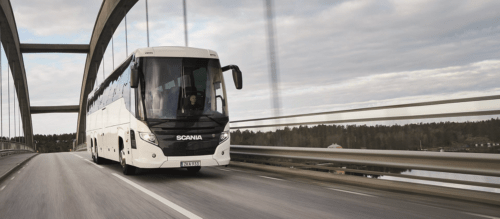
Scania has signed a letter of intent with its principal steel supplier SSAB to decarbonise all steel deliveries for its heavy-duty vehicles in 2030. Deliveries of SSABs Fossil-Free steel are planned to ramp up from smaller amounts starting in 2026 and, says Scania, will be key in the shift towards a sustainable transport system.
Scania says the new deal is a next step in the long-standing relationship, and will lead to radically lowered climate emissions. The ambition for decarbonised deliveries is among the boldest of intentions agreed between SSAB and a customer, Scania says, and marks an ambitious plan to reduce the carbon footprint in hard-to-abate sectors. Through this partnership, Scania and SSAB say they are committed to use their purchasing power to create early markets for innovative clean technologies.
“I’m glad and proud that we have reached this agreement. Scania’s purpose is to drive the shift towards a sustainable transport system. To fulfil that purpose, we take action across the value chain together with partners as SSAB, which is at the forefront in the transition to a sustainable steel industry,” said Scania CEO Christian Levin.
SSAB CEO Martin Lindqvist added: “We are truly looking forward to ramping up the deliveries of our fossil-free steel, thereby contributing to more sustainable value chains. Fossil-free steel will be a game-changer in heavy transport. It has the same high quality and technical properties as traditional steel. And, while being produced in a sustainable way, it can also be recycled just like steel has always been.”
SSAB says it plans to deliver its Fossil-Free steel to the market at commercial scale in 2026 and for its operations to be largely fossil-free around 2030. It is manufactured using the technology which replaces the coking coal traditionally used for iron ore-based steelmaking with fossil-free electricity and hydrogen, resulting in a by-product of water instead of carbon dioxide.
Scania’s supply chain decarbonisation strategy and targets will initially focus on its production in Europe but will later be extended to its production in China and Latin America.

